Philip Wasielewski
Key Points
- From late June to mid-July 2023, I visited Georgia, Moldova, Hungary, Poland, and Lithuania on a research trip. The analysis and conclusions in this report are based, in part, on conversations with a wide variety of individuals from former government officials, university students, academics, and members of non-governmental organizations to ordinary citizens.
- The Kremlin desires to reestablish a sphere of influence in former Soviet republics and Warsaw Pact states between the Black and Baltic Seas. To do so, it is fighting a conventional war in Ukraine and political wars elsewhere to remove Western influence and reestablish hegemony.Russia’s political warfare operations have a major flaw; they only offer people the past and not a future. However, US efforts against them could be more effective and citizens in frontline states facing Russian subversion have constructive criticisms to improve them. Resisting Russian subversion depends as much on the political health of the targeted state as Western countermeasures. Efforts to oppose backsliding on democratic norms are vital, even if they spark tensions with partners and allies.
- Several countries in the region will hold elections between the fall of 2023 and 2025 that will determine their geopolitical orientation. If the war in Ukraine is a battle of modern weapon systems, these elections will be a war of ideas between East and West. It is important that the United States not cede the narrative for these elections to Moscow and work with allies and partners to counteract anti-Western propaganda.
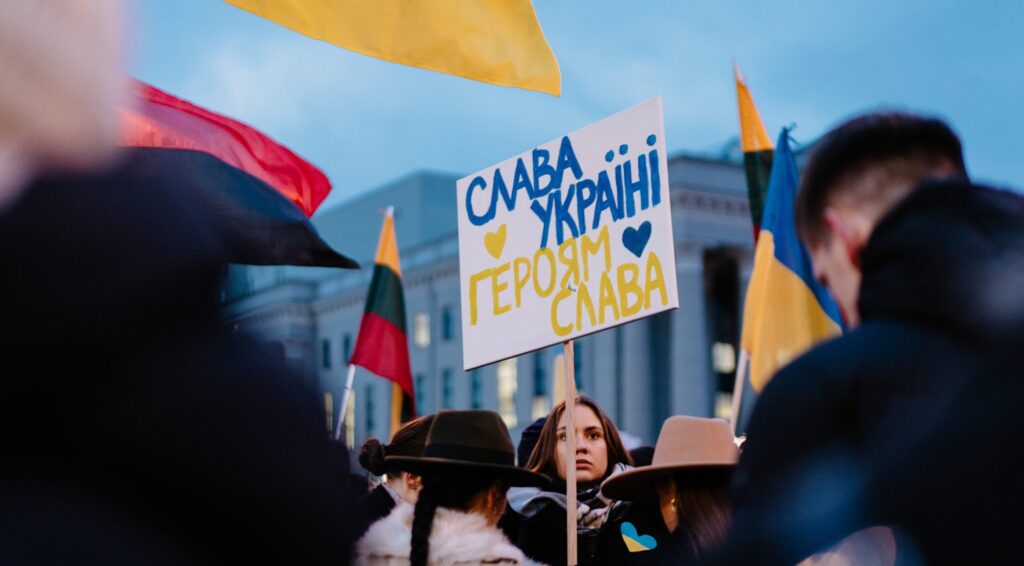
Lithuanians protesting against the Russian invasion of Ukraine, February 2022.
Executive Summary
To regain its sphere of influence in the former Soviet republics and Warsaw Pact states, Russia is fighting a conventional war in Ukraine and political wars elsewhere. States targeted by Russian political warfare tools of subversion and economic pressure have a different type of frontline than Ukraine, but a frontline nonetheless. Many are NATO members; some are not. I traveled to five of them—Georgia, Moldova, Hungary, Poland, and Lithuania—to learn how Russian political warfare was working and the implications for US foreign policy.
While Georgia’s government supports Moscow’s war in Ukraine, many Georgians do not and fear being on the wrong side of a new iron curtain. Moldova’s government believes the Russo-Ukraine War shows that neutrality no longer provides security and wants to integrate into Western institutions. Its population, however, is torn between East and West and remains uncertain in which direction security can be found. Hungary, a NATO and European Union (EU) member, rejects many NATO/EU principles while enjoying their security and economic benefits. Protected by geography and motivated by a selective history, its leader has made common cause with Russia to be a pivot between East and West, but more importantly, to stay in power. Poland, with a similar domestic situation to Hungary but a different historical and geographical one, strongly opposes Russia. However, its disagreements with the European Union, fractious domestic politics, and painful historical legacies might create political instability that could undermine its efforts. Finally, of the countries I visited, Lithuania is the most loyal adherent to NATO and EU principles, but fears that if Russia is not deterred, a war could destroy Lithuania even if it is on the winning side.
Russia’s political warfare strategy is to remove Western influence and reestablish Moscow’s hegemony in the Caucasus and Eastern Europe. It’s attempting to do so by exploiting peoples’ fears that their identity and welfare are threatened. Key identity issues are minority group grievances, and religious and cultural values. Welfare issues are based on economic needs or threats to those needs. These fears are turned into narratives to convince people that the West is the source of their problems and that Russia and pro-Russian governments are the solution.
However, Russia’s political warfare strategy has a major flaw; it offers people only the past and not a future. The United States has an opportunity to combat these operations, overturn Russian successes, and reinforce liberal democratic values. While America is already engaged in these frontline states, many of their citizens offer constructive criticism on how US efforts can be improved. There is a palpable fear of Russian aggression in most states, but also a belief that only the United States has the military, economic, and moral power to protect them.

Introduction
In the FPRI report, Fighting to Win: Ukraine, Russia, and the War for Survival, I state that Russia’s strategic goal in Ukraine is to weaken NATO to regain its sphere of influence in the former Soviet republics and Warsaw Pact states.[2] Therefore, it is waging conventional warfare in Ukraine but also political warfare[3] in these other states. For Russia, these states should be “independent but not sovereign,” meaning without the authority to make their own decisions when those decisions conflict with Moscow’s interests.
Thanks to FPRI, I was able to travel to both Ukraine and several frontline states to better understand Russia’s conventional and political wars in the region, and the implications for US foreign policy. This article is the result of what I heard and saw during that journey. It is written so that the main points are made by the inhabitants of the frontline states themselves (e.g., former government officials, university students, academics, members of non-governmental organizations (NGOs), and average people from shop owners to taxi drivers, even anonymous folks sharing a train compartment or bus ride). They spoke for themselves and illuminated what is going on in the region. Interspersed are my own analyses and personal observations. As the late, great American philosopher, Yogi Berra, once said, “You can observe a lot by just watching.”
How accurate are these impressions since there is a human tendency to tell guests what one thinks they may want to hear? Most knew I was an American and may have been polite in their comments, but they also shared criticisms and frustrations about America. Since I found many commonalities in their remarks, they all could not have been part of a coordinated information campaign.
In an earlier era, the states from Finland to the Caucasus were considered a cordon sanitaire against Bolshevism. Today they are frontline states against Russian subversion. I traveled to five of them between late June and mid-July 2023: Georgia, Moldova, Hungary, Poland, and Lithuania. The first two are former Soviet republics belonging to neither NATO nor the European Union. The last three are NATO and EU members, but Hungary takes an independent approach towards Russia and Ukraine.
What follows are lessons from that journey.
Georgia
The view from the top of Tbilisi’s tallest building, the Axis Towers, provides a stunning panorama of the Georgian capital spreading along the Kura River. For millennia, Tbilisi has been the locus of competition between neighboring empires—Roman, Byzantine, Persian, Ottoman, and finally Russian. In the late 18th century, eastern Georgia was a vassal of Persia but developed economic and political ties with Russia culminating in an alliance in 1783. In retaliation, the Persians sacked Tbilisi in 1795 causing the last Georgian king in 1800 to seek full Russian protection. However, instead of a treaty of mutual assent, Tsar Alexander I unilaterally incorporated Georgia into his empire.[4]
When the Russian Empire fell, Georgia was independent for three years before being forcibly annexed into the Soviet Union in 1921. It regained independence in 1991 and was led by former Soviet Foreign Minister Eduard Shevardnadze. He was ousted by Mikheil Saakashvili in 2003 during the Rose Revolution, which demanded a more democratic Georgia and an end to corruption. Because of its efforts to integrate into Euro-Atlantic institutions, the first two decades of Georgia’s regained independence were the heyday of its relationship with the West and particularly the United States. Georgia was a major recipient of foreign assistance and the frequent destination of high-level US delegations, while Georgian troops supported American operations in Iraq and Afghanistan. Georgia aspired to EU and NATO membership while slowly decoupling from its economic and political dependence on Moscow. Russia’s economic boycotts of Georgian products in 2006 and the war in 2008 reinforced this trend.
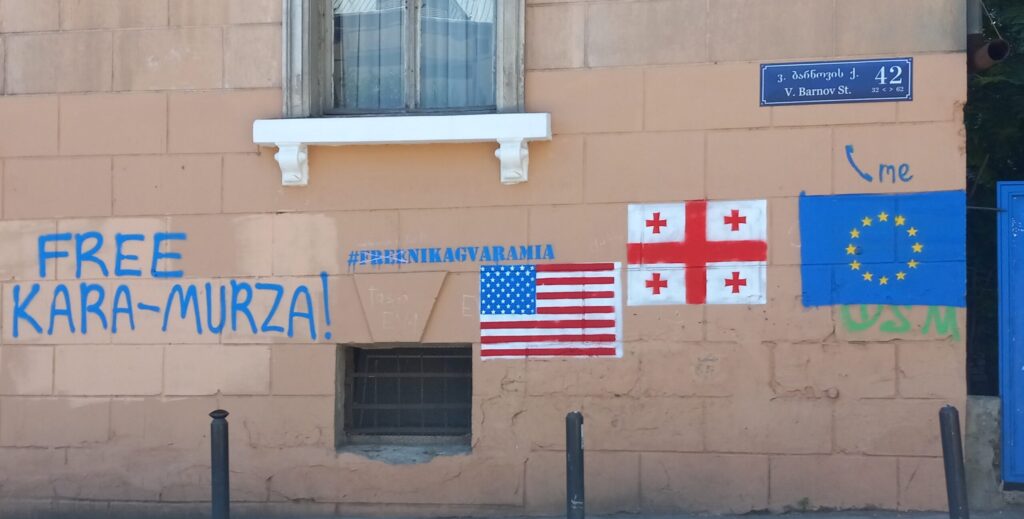
While the government maintains a pro-Russian, anti-Western attitude, Georgian popular opinion expressed widely in local Tbilisi graffiti tells another story.
However, what was once a promising Western-oriented country is today increasingly authoritarian and pro-Russian. The State Department has criticized Georgia for helping Russia circumvent sanctions, and despite Western pleas for humanitarian release, Saakashvili languishes in a Georgian jail, possibly poisoned by his wardens.[5]
To help me understand this turn of events, I sat down with former Georgian ambassador to the United States and FPRI Senior Fellow Batu Kutelia at a restaurant on the top floor of the Axis Towers. Kutelia said Georgia’s current situation was the result of domestic backsliding from democratic norms and Russian subversion of Georgian sovereignty. In his opinion, Georgia, under the leadership of the Georgian Dream (GD) Party founded by Bidzina Ivanishvili, is an example of “competitive authoritarianism” where there seems to be competition but outcomes are predetermined because of state controls on the political and electoral systems.[6] At the beginning of its rule in 2012, GD strove to keep Georgia in a “gray zone” by maintaining a pro-Western façade, but when the Russo-Ukraine War began, the façade disappeared and Georgia’s government sided with Russia.
Kutelia sees the war in Ukraine as part of Russia’s larger war against democracy that President Vladimir Putin declared in 2007 at the Munich Security Conference and whose first shots were fired in 2008 in Georgia. The war, he says, extends beyond Ukraine to all of Europe as Russia tries to subvert democratic societies by exploiting economic weaknesses, corrupt officials, minority group tensions, and religious beliefs.
Pointing to the view below us, Kutelia reminds me that Russia, even under Yeltsin, has always attempted to undermine Georgian sovereignty through a combination of military actions and domestic subversion. GD exploits the threat of a renewed war with Russia to justify its pro-Moscow foreign policy as well as attacks on the opposition whom it classifies as “foreign agents” trying to drag Georgia into war. This approach is supported by the Georgian Orthodox Church, which has also preached against foreign agents and influences. GD, like Putin with the Russian Orthodox Church, Kutelia explained, wants to exploit the church’s influence on society but not let it become an independent power. This is why the government leaked embarrassing information about past church abuses as a warning to its hierarchy.
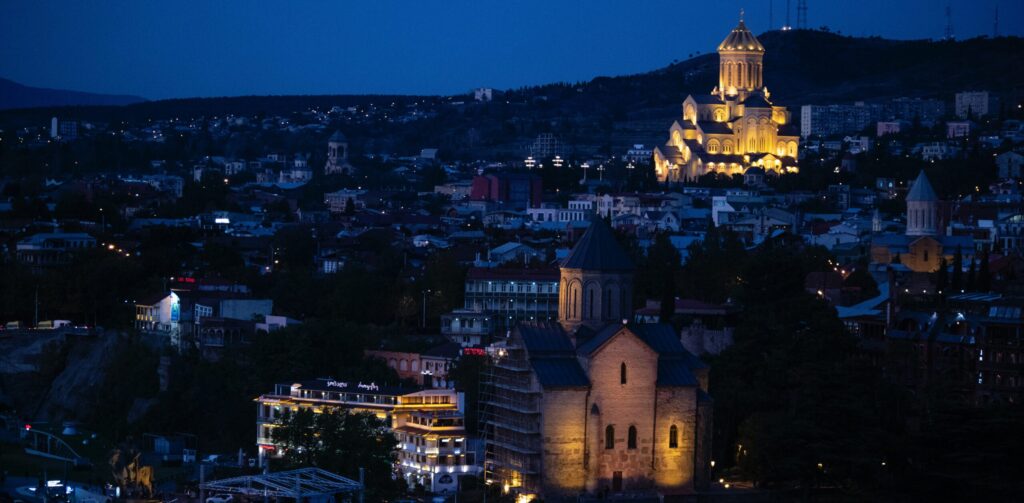
Tbilisi, Georgia.
The Georgian Orthodox Church wields major political power in Georgia. The church’s relationship with Saakashvili’s government had been cool due to his emphasis on modernization and Westernization, but many churchmen actively supported GD in the 2012 parliamentary elections.[7] In return for political loyalty, the church receives material benefits, a tradition that originated under former president Shevardnadze. In 2021, it received approximately $8 million annually from the state budget.[8]
What concerns Kutelia is not just the church’s closeness to the government, but its closeness to Russia and the mirroring of Georgian government and church narratives regarding Ukraine with Moscow’s narratives.[9] According to him, this is not a coincidence since many Georgian Orthodox priests are educated at the Moscow Theological Academy. Those Georgian Orthodox Church clergy trained in Greek or Romanian seminaries are less likely to espouse pro-Russian narratives.
Fortunately, Kutelia said, Georgian government support for Russia cannot be unconditional due to public opinion. He said that 80 percent of Georgian society supports entry into the EU/NATO and a Ukrainian victory over Russia. It is one of the reasons that Georgia has hundreds of volunteers fighting in Ukraine.[10] While the government supported by the church uses conservative values and anti-Western rhetoric to justify its pro-Moscow foreign policy, this appeasement policy is not supported by most of the people. If the opposition, usually split but temporarily united in its support for Ukraine, can leverage this popular discontent, says Kutelia, it may defeat GD in the 2024 parliamentary elections. However, he warns that international pressure is needed to prevent GD from again using bribery, coercion, intimidation, and fraud in the electoral process.
Georgia’s politics also face apathy and economic pressures. Speaking with a group of Georgian university students, I was struck by their willingness to seek change (a factor probably common among all youth) but also their wariness about politics. They were repelled by Georgia’s degraded political discourse that resembled tribal fighting and said elites no longer discuss the future but only attack each other. These students said this atmosphere, where no political party can be taken seriously, creates apathy and decreased political participation. For many who do vote, the current government is a safe choice because of fears of instability and economic insecurity. Some students look beyond Georgia for a catalyst to change their politics. They hope a Ukrainian victory will bring political change in Russia because, historically, major political changes in Georgia have come after major changes in Russia (e.g., 1918 and 1991). However, if Russia wins in Ukraine, these students fear being left on the wrong side of a new iron curtain should Georgia continue along a pro-Moscow path.
Georgia’s economic dependence on Russia was a regular topic of conversation. Irakli Porchkidze, vice president of the Georgian Institute of Strategic Studies, told me that economic dependence on Russia was partly due to Georgian government policies. The government ended Georgia’s independence from Russian gas and imports large amounts of Russian oil and petroleum products in comparison to a decade ago. Russia is now Georgia’s second-largest customer for wine and a major importer of agricultural products. This is important for a country where agriculture employs approximately half the population. Additionally, financial remittances from Russia, thanks to the over 100,000 newly arrived Russian immigrants, equaled Georgia’s foreign direct investment in 2022.[11]
By overturning a decades-old policy to leave Russia’s economic sphere, the government has made its pro-Russia policy essential to maintaining the country’s economic health. Therefore, many voters support GD not just as a political choice but as an economic necessity.
However, what worried Porchkidze as much as Russia’s increased leverage in Georgian politics was America’s relative disengagement. He said that anti-Western rhetoric by Georgian Prime Minister Irakli Garibashvili and others needed sterner reactions from Washington. He noted the favorable Georgian public reaction to US sanctions against four Georgian judges for undermining the rule of law, in what is considered a rebuke for their actions in jailing former president Saakashvili. He suggested that sanctions of increased scope and severity were needed to counter other Georgian government attacks against the rule of law.
There also needs to be pushback, per Porchkidze, against the Georgian government repeating Russia’s narrative that the war is Ukraine’s fault. The Georgian government attacks opposition leaders who support Ukraine as warmongers and claims that its policy is to not allow the West to drag it into the war. This narrative accomplishes two objectives. First, it garners electoral support by playing on fears of another war with Russia. Second, it depicts the opposition as wanting war at the behest of foreign powers and justifies actions against them as protecting Georgian sovereignty against foreign agents. This also echoes Russian narratives that domestic opposition is always the result of Western interference, foreign agents, or traitors.
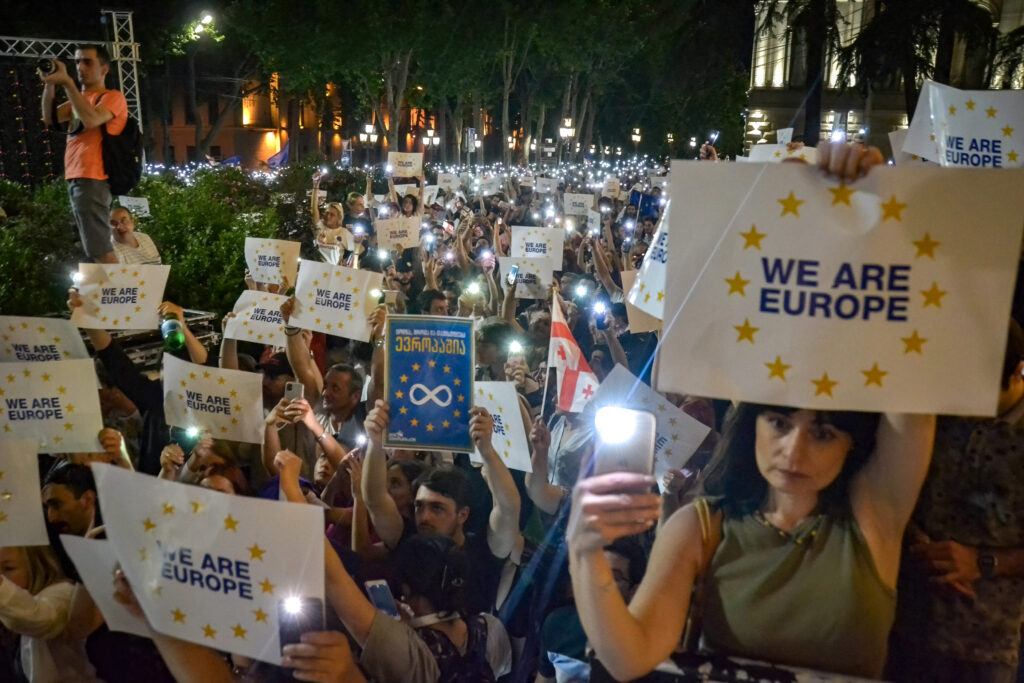
Pro EU protesters hold their smartphone with the flashlight on and placards written on them “We Are Europe” during the demonstration. After the decision of the European Commission who recommended that Georgia be denied EU (European Union) candidate status, thousands of people marched across the center of Tbilisi expressing their opinions while demanding to join the European Union.
Still, Porchkidze is optimistic about the 2024 parliamentary elections in Georgia. He believes the government will be constrained from major electoral manipulation due to Georgia’s pending EU membership request. Porchkidze says the government must be circumspect in its actions. Losing a chance at EU membership could mean GD losing the election. Therefore, he believes the West has a unique chance to exert leverage on Georgia’s government regarding its assault on Georgia’s democratic institutions and pro-Russian stance.
Giorgi Kandelaki, a student leader during the Rose Revolution and Georgian parliamentarian from 2008–2020, is less sanguine about the future. We met in the spartan quarters of the Soviet Past Research Laboratory, an NGO aimed at memorializing Soviet crimes in Georgia, where he works on countering Russian disinformation. He doubts that GD’s behavior will be moderated before the elections saying that their “fear of war” narrative works and cited a recent poll in June 2023 where almost 50 percent of Georgians agreed with the government’s policy on Ukraine. The government’s hostility towards Ukraine and the opposition will remain unabated, he said, noting how the government harasses returning Georgian veterans from Ukraine and tells many not to come back. Kandelaki fears a frozen conflict in Ukraine will give Putin time to erode support for Ukraine via information operations during upcoming European elections.
An example of one information operation is how Russia has skillfully exploited Joseph Stalin’s Georgian origins. Stalin, born Ioseb Dzhugashvili, was the world’s most famous Georgian and remains a subject of interest in his native land. Kandelaki stated that Russian information operations use preexisting sympathies towards Stalin as a gateway to make Georgians receptive to other Russian narratives. The strategic, long-term project of Russian influence operations in Georgia is to cultivate an anti-Western, nativist strain of Georgian nationalism and Stalin is a natural part in this endeavor. As Kandelaki has written, persuading millions of people to take pride in a man who killed tens of millions is a tall order, but Russia has succeeded. Once this is done, people will accept other narratives such as there is a Western conspiracy against the Orthodox religion, which Stalin stood up to, and other such theories.[12]
Kandelaki says that these narratives aimed at average Georgians are more effective than American ones aimed at elites. He also lamented that American leverage in Georgia has shrunk from disuse by not more directly confronting GD over democratic backsliding and anti-American statements. However, he noted that American words still matter to average citizens when spoken to them or, more importantly, demonstrated via actions. Like Porchkidze, he referenced the positive public reaction to US sanctions against four Georgian judges and hoped for further sanctions against corrupt officials including GD founder and billionaire Ivanishvili, who has never been sanctioned despite his US investments.
During my stay in Georgia, a common theme of many conversations, including several which were off the record, was the fear that Russian might again attack Georgia, either economically as in 2006, or militarily as in 2008; the belief that the United States was the only country who could prevent this; and the hope that Washington would become more engaged in Georgian affairs as it once was.
Many Georgians see government rhetoric for what it is but hesitate to oppose it because they are uncertain of US support. Some complain that the American “reset” of relations with Russia after its 2008 invasion of Georgia showed a default towards great-power-centric foreign policy at the expense of smaller states. By trying to maintain good relations with Moscow, and distracted by the War on Terror, Washington ignored the creeping retrenchment of Russian influence in Tbilisi.
Most Georgians want EU and NATO membership.[13] The government pretends this is a possibility while doing everything possible to edge closer to Moscow. As one Georgian told me, “We are not being reintegrated into the Soviet Union; we are being reabsorbed into the Russian empire like at the end of the 18th century.” While the Georgian government suppresses opposition in the name of sovereignty, it is surrendering sovereignty to Moscow. Russia has pursued a successful strategy in Georgia. Facets of this strategy—military intimidation, disinformation, subversion, economic pressure, etc.—were also evident in other states I would visit. One reason why Russia uses these tools against other states may be because they worked in Georgia.
The fear of these tools working elsewhere is the subject of the next country I visited—Moldova—another former Soviet republic with part of its territory controlled by the Russian army and its politics subject to Russian subversion.
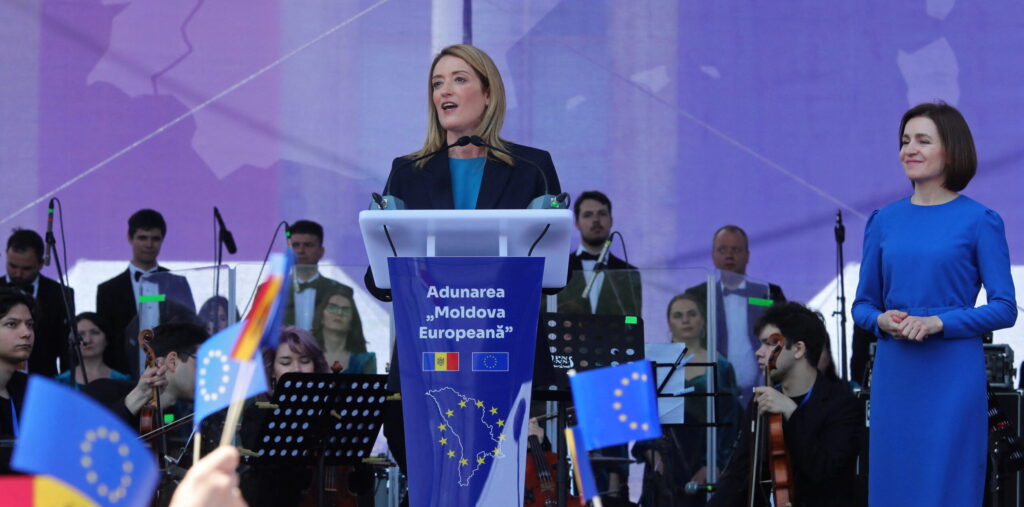
European Parliament President Roberta Metsola and Moldovan President Maia Sandu attend a rally to support the European path of the country, in Chisinau, Moldova May 21, 2023.
Moldova
In the center of Moldova’s capital Chisinau is a stone arch commemorating the Russo-Turkish War of 1828–1829, after which Russia formally incorporated Moldova into its empire. To one side of the arch is an Orthodox cathedral whose bell tower was destroyed in 1962 by the Communists and rebuilt in 1997. On the arch’s opposite side is Moldova’s Government House, whose front façade is draped with two flags, Moldovan and European Union, extending the full six stories of the building. In front of the building is a monument commemorating those martyred after the Soviet Union seized Moldova from Romania in 1940. Therefore, within a 100-meter radius in central Chisinau is a summary of Moldova’s modern history, from present aspirations to its Soviet, Romanian, Russian, and Ottoman pasts. Moldova exemplifies William Faulkner’s quote that, “The past is never dead. It’s not even the past.”
Moldova’s heritage as an appendage of the Ottoman, Russian, and Soviet empires and two decades as part of Romania, coupled with a heterogenous population that is mostly Orthodox in faith but not Slavic in ethnicity, are key ingredients of its current political identity crisis. A central question for Moldova is whether to remain neutral but Russian-leaning, or embark upon a journey westward to enter the European Union and possibly NATO.
Moldova is a nation of 2.5 million set between Romania and Ukraine. Past governments have been formed by former Communists or other parties amenable to Moscow due to Moldova’s dependence on Russian energy and the presence of Russian troops in the breakaway Transnistria region. There is also considerable pro-Russian sentiment in the autonomous region of Gagauzia, which consists of approximately 150,000 Gagauz, ethnic Turks who converted to Orthodoxy and left the Ottoman Empire for southern Moldova between 1820–1846 after being given lands by Russian authorities.
However, in November 2020, a pro-Europe candidate, Maia Sandu, was elected president. She dissolved a pro-Russian parliament in April 2021. Elections in July 2021 resulted in victory for the pro-Western Party of Action and Solidarity and the appointment of reform-minded prime ministers. For the first time in its history Moldova has a pro-Western president, prime minister, and parliamentary majority, which resulted in the European Union extending it candidate status in July 2022.
Yet Moldova’s future is far from clear. It is home to three nationalist movements: one autonomist, one integrationist, and one secessionist. The autonomists are the Gagauz, the integrationists are Romanian speakers wishing to rejoin Romania, and the secessionists control Transnistria.[14] Besides these decentralizing tendencies, since the Russo-Ukraine War began, Russia has attempted to destabilize Moldova by cutting gas supplies, cyberattacks, and an alleged coup attempt in February 2023.[15]
To help me understand more about Moldova, I turned to Vlad Kulminski, Moldova’s former deputy prime minister for integration. According to Kulminski, while elites now believe Moldova’s security requires Western integration, it is too early to tell if the rest of society has changed its default mentality to remain between East and West. He believes the 2024 presidential election and 2025 parliamentary elections will be crucial. The last election, he said, was about a functional government but the next elections will be about geopolitical choices. Moldova has a long way to go to meet certain EU criteria and if the country is unable to reform fast enough, this opportunity might slip by. He estimates that Moldova has a two- or three-year window to make these reforms, otherwise domestic politics could demand a return to neutrality. Neutrality, per se, is not bad according to Kulminski, but leaves Moldova more susceptible to Russian subversion and outright coercion.
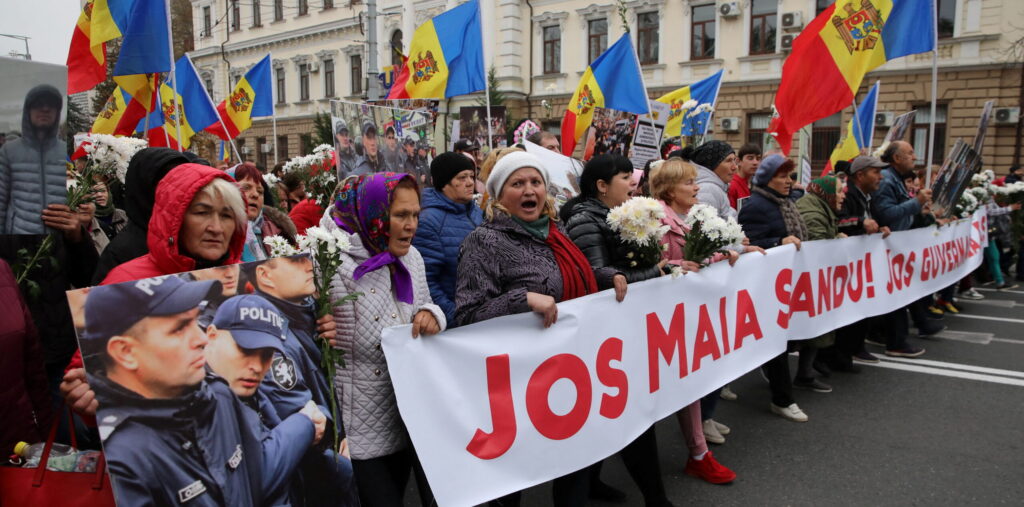
Demonstrators carry a banner reading “Down with Maia Sandu! Down with the government!” during an anti-government protest in Chisinau, Moldova November 6, 2022.
With this background, I turned to Valeriu Paša, founder of Watchdog, a Moldovan NGO that conducts social polling, to help me understand the viewpoints of Moldova’s society. Paša greeted me at his headquarters in Chisinau with a wealth of statistics on Moldovan attitudes. According to him, Moldovan governments are traditionally hesitant to get ahead of public opinion and pro-Russia policies are understandable considering that before the war, Putin was the most popular politician in Moldova with a 59 percent favorable rating. As of June 2023, the number of Moldovans who express “some” or “a lot” of confidence in Putin stands at 37 percent (in that same poll, President Joe Biden stood at 33.5 percent). Prior to the war, 48 percent of Moldovans supported joining the European Union but 38 percent supported joining the Moscow-controlled Eurasian Economic Union. In June, 2023, Moldovans preferred EU membership to membership in the Eurasian Economic Union by 53 to 27 percent, but only 33 percent wanted to join NATO and over 52 percent did not.[16]
Paša informed me that Moldovan opinion was strongly influenced by economics and less by ideology. He faulted Moldova’s government for wasting a window of opportunity when the war began to influence society’s perceptions, since even pro-Russian media in Moldova did not immediately support Russia’s invasion. However, Moldova’s pro-Russian media have adapted and, instead of a pro-war narrative, they espouse an anti-Western one claiming the European Union is pro-war and the war is the result of NATO expansion. Paša also faults Western embassies and institutions for not reaching out to average Moldovans. NATO does a poor job explaining its value, he said, and US public diplomacy does not advance America’s image. The image of the United States itself is good in Moldova, according to Paša, but it is the image of US foreign and domestic policies that need advancing and defending from Russian attacks. As a positive example, he noted that a few years ago when the US ambassador played a visible role in efforts against corrupt oligarchs, American influence and prestige in Moldovan society increased. Even pro-Russian groups, he said, are afraid of statements coming out of the US embassy.
Seghei Ostaf, a human rights lawyer and former government advisor, was also concerned about the receptive audience for Russian narratives and limited US efforts to refute them. He said approximately 20–25 percent of the population—mainly the elderly, Russian-speakers in northern Moldova, the Gagauz minority, and businessmen with economic ties to Russia—are naturally receptive to Russian narratives. He estimates another 25 percent is susceptible to Russian propaganda during economic hard times. Furthermore, approximately two-thirds of the Orthodox faithful in Moldova belong to the Moldovan Orthodox Church, which is subordinate to the Russian Orthodox Church, and therefore recipients of its soft power messages.
According to Ostaf, a powerful Russian narrative is that Moldova’s association with the United States will provoke war and that America’s wars (e.g., Afghanistan, Iraq, Libya, Syria, etc.) are disasters for the locals. He noted that while America invests a lot in Moldova, it is not guarding that investment from Russian propaganda. “It’s funny,” he told me, “that with the size of your media, you don’t protect your image in Moldova better.”
Russia’s subversive activity in Moldova has made it an adjunct battlefield to Ukraine, according to Vadim Pistrinciuc, a former advisor to the prime minister (2012–2013) and member of parliament (2014–2019). He described how Moldova’s government banned rebroadcasts of Russian political television shows but Russian propaganda just shifted to Facebook, TikTok, and other social media. Meanwhile, Russian trolls demonized the 300,000 Ukrainian refugees in the country, three-quarters of whom live in Moldovan households. Russia created an energy crisis in Moldova by cutting gas supplies by one-third[17] and then sponsored street demonstrations against the government. This attempt to freeze and bankrupt Moldova failed but it did create an inflation rate last winter of 30 percent.
Pistrinciuc is worried about Russian interference in the upcoming 2024 and 2025 elections. Russia is dying, he said, for relations with some “normal” government and a return of a pro-Russian government in Moldova that would help legitimize its narratives. He said that only American support could keep this from happening but he also had a critique about past US policy advice. Since independence, he said, successive US administrations warned Chisinau not to provoke Russia, which it did not, but this never ended Russia’s interference in Moldovan affairs. There will be no democracy in Moldova, Pistrinciuc warned, if Russian interference continues. Moldova needs help to preserve its democracy and develop resiliency against Russian subversion. In the past Moldovans were told by the United States to be “ballerinas,” to balance Russia’s demands, and not be “boxers” against Moscow. “Now we need to know how to box!”
Moldova is like a ship with its sails catching a westward breeze but an anchor of its past keeping it from moving quickly in that direction. A sizeable part of its population remains malleable to Moscow’s influence not just because of Soviet memories but memories ingrained since the Russian empire. As in Georgia, Russia uses a frozen conflict and economic leverage openly and influences society covertly to try to keep Moldova from moving from its orbit. As I moved from the Black Sea region to Central Europe, I found another country with an entirely different historical and cultural background also straddling between East and West.
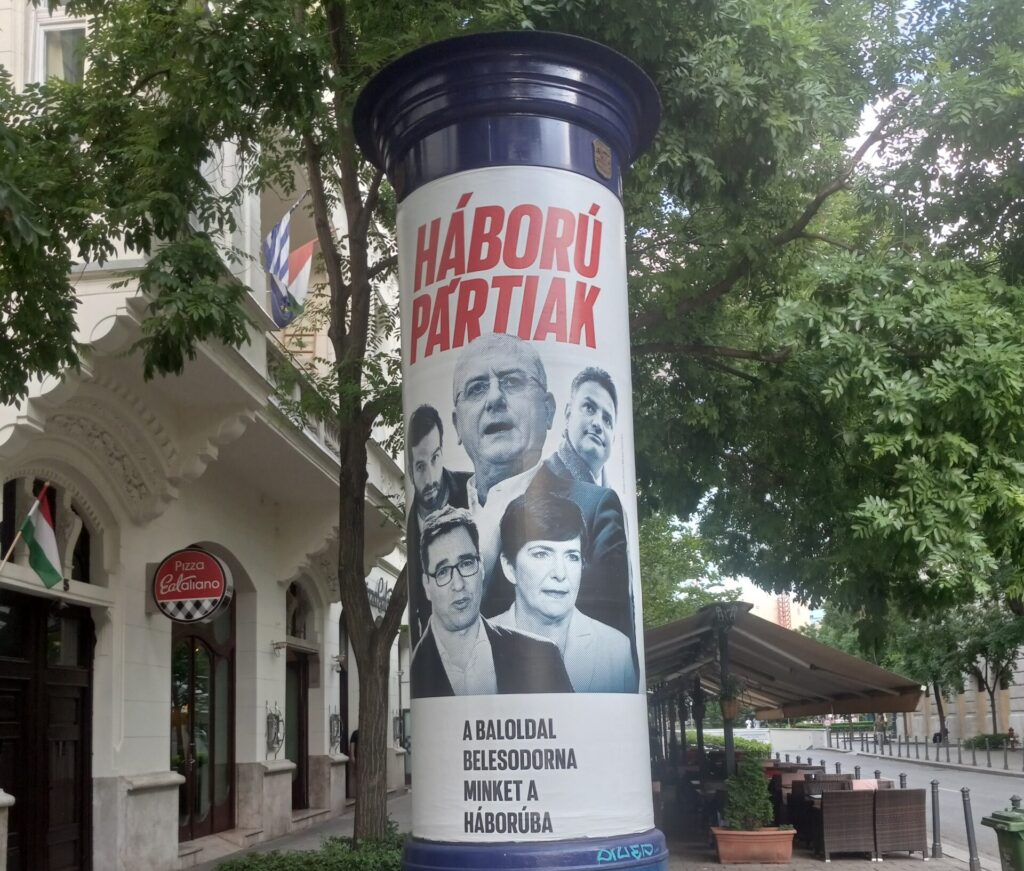
The ubiquitous presence of anti-opposition posters in Budapest with the caption “They Want War” next to pictures of top opposition leaders.
Hungary
Hungary is an outlier to the West’s response to Russian aggression in Ukraine. While Hungary has agreed on most EU sanctions against Russia, it has done little to diversify its energy dependence on Moscow or support Ukraine. In December 2022, Hungary initially blocked an 18 billion euro ($19 billion) EU financial package for Ukraine and in June 2023, voted against funds for the European Union’s long-term commitment to bolster Ukrainian security. Also in June, Hungary received from Russia eleven Ukrainian prisoners of war who were ethnic Hungarians and denied Ukrainian consular officials access to them.[18]
Under the leadership of Prime Minister Viktor Orban, Hungary has also been an exception in European politics. Hungary opposes the European Union on immigration policy while Brussels has sanctioned Hungary over rule-of-law reforms, to name just a few quarrels.[19] In the past six years, 60 percent of all vetoes in EU affairs have come from Hungary.[20]
Why is an EU and NATO member resistant to supporting Ukraine? Are Orban’s policies the result of Russian political warfare or are they those of an independent leader protecting the sovereignty and economy of his country? What are the sources of Hungarian conduct?
Searching for this answer brought me to a small 19th-century chapel on a windswept hill just outside of Budapest. With me is Dr. Attila Demko, head of the Center for Geopolitics at Mathias Corvinus Collegium and a former advisor to Orban. According to him, geography and history shape Hungary’s foreign policy. Being a land-locked country, it is hard for Hungary to diversify its energy sources, but Hungary’s geographic position also provides security with regards to the Russo-Ukraine War. Demko said that Hungary has issues with both Russia and Ukraine but doubts Russia’s army could ever reach Hungary’s borders. Conflict with Ukraine is based on Kyiv’s treatment of its Hungarian minority population. This leads to the second driver of Hungarian foreign policy—history, specifically, the 1920 Treaty of Trianon.
The Treaty of Trianon ended World War I between the Allies and Hungary and reshaped her borders to their current dimensions. The treaty created Hungarian minority communities in today’s Romania, Serbia, Slovakia, and Ukraine from parts of the Kingdom of Hungary—the treaty also gave Romania the present-day territory of Moldova. The Hungarian minority issue and other aspects of the treaty, Demko insists, are key to understanding Hungary’s relations with Ukraine, the West, and Russia. Trianon deprived Hungary of two-thirds of its land and one- third of its population and remains a source of Hungarian discontent with the West, said Demko, since it was signed by London, Paris, and Washington but not by Moscow. The Russians never tried to “Russify” Hungarians like they tried elsewhere, but Hungarian communities have faced “Ukrainianization, Slovakization, and Romanianization.” According to Demko, Ukraine mistreats its Hungarian minority by persecuting its leaders and suppressing its language, although he acknowledged a controversial Ukrainian language law had just been suspended due to pressure from the Council of Europe. The language issue is a red line for us, he said, because it is about the survival of the Hungarians as a distinct nation that will not be assimilated.
Demko then turned to the chapel, explaining how German immigrants built it during the Hapsburg empire, and pointed to a German inscription preserved over its entrance. We want for our people outside of Hungary, he said, what Germans still have here: the freedom to use their own language and preserve their cultural heritage. Demko said this was extremely important to Hungarians because many cultural sites in Hungary had been destroyed in World War II and much of its cultural heritage is now outside the country.
When asked what drove Hungary’s relations with Russia, Demko returned to geography and the limitations it imposes on energy sources because of the location of pipelines and the lack of a port to receive liquefied natural gas. He said Russian-Hungarian relations are “interest-based” not ideological. Russia does conduct information operations against Hungary as Facebook trolls put out Russian news for Hungarian viewers mixing true and false stories to push Moscow’s narratives. Demko further acknowledged Russian attempts to exploit Hungary’s diaspora concerns via false flag operations. One example he cited was the 2018 Russian operation that blew up a Hungarian cultural center in Uzhhorod, Ukraine, to exacerbate Hungarian-Ukrainian relations.[21] Hungarians do not have a cultural affinity towards Russians, Demko told me (and I heard far less Russian spoken on the streets of Budapest than I did in London or Paris); but the Russian threat to Hungary is far away while the threat from neighboring countries against Hungarians is closer.
Upon returning to Budapest, I visited the Memorial of National Unity commemorating the 100th anniversary of the Treaty of Trianon. It invokes comparison with the Vietnam War memorial with two parallel black stone walls on which are carved the names of over a thousand Hungarian settlements now outside Hungary’s borders after 1920. The monument is powerful in its simple expression of national loss. Is this, what is known as Trianon Trauma, the main driving force of Hungarian foreign policy or are others?
That question brought me to the book-lined apartment of István Hegedűs, chairman of the Hungarian Europe Society, an early associate of Orban, former member of his Fidesz party (1988–1994), and a former parliamentarian (1990–1994). He has since split with both Orban and Fidesz. Hegedűs explained that the driving force for Hungarian policy, foreign or domestic, is Orban and to understand Hungarian statecraft, one must understand Orban’s beliefs. In Hegedűs’ opinion, Orban believes that Hungary must regain sovereignty it lost by joining the European Union and NATO. He will not leave either organization because of their economic or security benefits, but wants an “a la carte” relationship to pick and choose what he likes from each. Twenty years ago, Orban established a special relationship with Putin to counterbalance Hungary’s Western associations. The benefits of this special relationship were cheap gas, bank loans, and help with nuclear power, while Hungary refrained from criticizing Russia. Hegedűs said that Orban believes that his special relationship will make Hungary an important pivot between Russia and Europe. However, as Hegedűs observes, this strategy is a failure internationally since no Western leader trusts Orban—but it is a success domestically. Orban promised voters that he would keep them out of war and protect Hungary’s economy with cheap gas from Russia. The voters responded by giving him and Fidesz an overwhelming victory in the April 2022 elections.
According to Hegedűs, Orban and his supporters accept Putin’s narrative that Ukraine is not a real country. EU partners are portrayed as pro-war and the United States is attacked not only over Ukraine but over social issues. These arguments work well with Hungarians. With the opposition splintered since the last election, there are few counterarguments. For the opposition, being pro-Ukraine is no longer a winning strategy, which Hegedűs said is a miscalculation although pro-Ukrainian demonstrations draw few people.
Hegedűs’ comments rang true because, of all other European capitals I visited that summer, Ukrainian flags were prominent in Budapest by their almost complete absence. The opposition mayor of Budapest, Gergely Karácsony, flies one at the city hall but few others are visible. What is ubiquitous throughout Budapest are posters portraying five opposition leaders, including Karácsony, with the caption underneath, “They Want War.” With the next election still years away, Fidesz is waging a permanent campaign against the opposition and signaling its intent to maintain its policies regarding Russia and Ukraine.
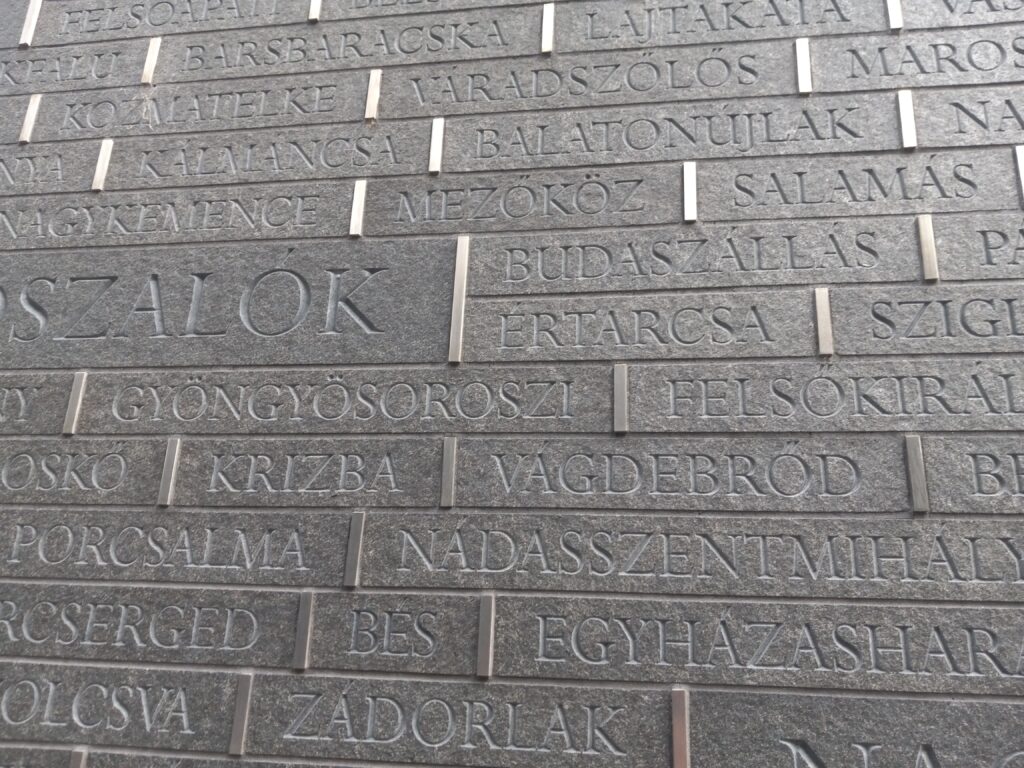
Memorial of National Unity in Budapest.
Orban has an ideological mission to change Hungary, Hegedűs informed me. His pro-Russian orientation must be understood as a rejection of Western liberal values. He is creating an illiberal state in Hungary by giving voters a package of Hungarian exceptionalism, national pride, and the fear of the other (e.g., immigrants, meddling foreigners, or progressive social trends) and portrays himself as protecting Hungary against them.
Regarding the influence of history on Hungarian policy, Hegedűs stated that some of the right-wing electorate may be influenced by a narrative of how badly the West has treated Hungary, but Trianon is a secondary influence on voter behavior. Hungary was not the only country on the wrong side in World War I that lost territory. Ukraine may not respect minority rights in schools, but its recent language law was aimed at Russians, not Hungarians, and if it wants to join the European Union, it must change this regulation. The number of Hungarians in Ukraine is smaller than the number in Serbia or Slovakia, where there are also issues, but Orban maintains good relations with Serbia’s president and takes a moderate path with Slovakia knowing he needs allies among the Visegrád Group (i.e., Poland, Czechia, Slovakia, Hungary) in his battles with Brussels. Hegedűs also said that Orban’s ideology, more than Hungary’s geography, prevents energy diversification. There are options, said Hegedűs, and Hungary could follow the lead of other EU states. Orban’s unwillingness to try is indicative of his belief that Russia will win the war and its gas trade with Europe will return to normal.
Hegedűs’ parting words to me were, “America should not mistake Hungary’s government for its people.” I received a similar message from Dr. István Gyarmati, Hungary’s former undersecretary of defense for policy. He believes that Orban’s government is temporary but not short-lived, meaning the United States should not expect drastic changes in Hungarian policy and instead should reach out to possible allies in the government to affect gradual change. He said that Hungary helps Ukraine with fuel shipments and humanitarian aid and has increased defense spending (points Demko also made), but Hungary’s foreign policy is driven by its interests. The main interest for Hungary’s political elites is sovereignty followed by economics. Hungary’s leadership, he said, believes it is protecting the country from EU interference in internal affairs. Its economic interests are to maintain the flow of money and cheap energy from Russia. According to him, Hungary’s economic relationship with Russia is corrupt because of its lack of transparency, as in the case of the nuclear power plant contracts. This corruption affects the government’s view of the media, independent judiciary, and rule of law, because all three threaten a corrupt system. If you wish to change Hungary’s policies, Gyarmati says, you must first end its corruption. His explanation of the connection between Hungary’s diaspora and its foreign policy was more political than historical. Approximately a million diaspora Hungarians have Hungarian passports, vote in Hungary’s elections, and 90 percent usually vote for Fidesz, hence their importance, he said.
Hungary’s position as an outlier in Europe is confusing. It is a NATO and EU member often at odds with both over policy and who sees its sovereignty threatened not by Russia, as other frontline states do, but by the Euro-Atlantic institutions designed to protect it. What really influences Hungarian statecraft? Is it ghosts from the Treaty of Trianon or is it the vision of a leader with a personal relationship with a dictator who regularly threatens Hungary’s neighbors and allies?
Hungary’s dual nature is probably best understood by a walk in Budapest’s Liberty Square. Entering the square from the direction of the parliament building, one comes first to a life-sized bronze statue of Ronald Reagan and then to one of George H.W. Bush. These two presidents helped end the Cold War and helped Hungary regain its sovereignty from the Soviet Union. But nearby is an obelisk, which literally casts a shadow on these two bronzes. That obelisk is part of the monument commemorating the Soviet soldiers who liberated Hungary from the Nazis. Unlike in other post-Soviet states, there seems to be no intention to move or destroy this monument and it is as well-kept as the two bronzes of American presidents. Like these three monuments, Hungary remains fixed between East and West and unable or unwilling to move in either direction because it currently enjoys the benefits from being on both sides.
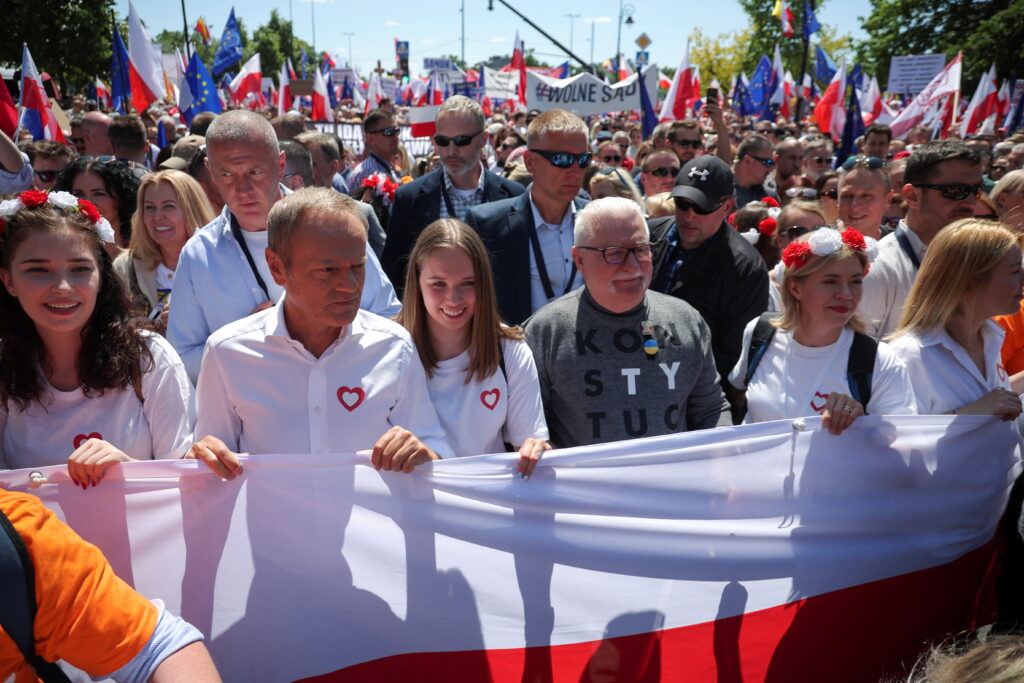
Leader of main opposition party Civic Platform (PO) Donald Tusk and former Polish President and Peace Nobel Prize laureate Lech Walesa take part in the march on the 34th anniversary of the first democratic elections in postwar Poland, in Warsaw, Poland, June 4, 2023.
Poland
Poland, like Hungary, has conflicts with the European Union over rule of law and immigration issues and believes that Brussels impinges on its sovereignty. Normally a state’s domestic politics influences its foreign policy; so why do Poland and Hungary with similar domestic situations have polar opposite foreign policies? Poland is a major supplier and conduit of military equipment to Ukraine, and has taken in millions of refugees. This can be partly explained by Poland’s historic animosity towards Russia. Despite this, how firm is Polish policy and are there any domestic political considerations that could change it? How impervious is Poland to Russian information operations? Are there any stresses on Polish-Ukrainian relations?
As with Georgia, Moldova, and Hungary, an understanding of Poland’s domestic politics, history, and geography can help answer these questions. Poland’s Law and Justice Party (PiS is the Polish abbreviation, pronounced “peace”) is led by Jarosław Kaczyński, whose twin brother, Lech Kaczyński, was president of Poland when he perished in April 2010, in a plane crash in Russia. He was flying there to commemorate the murders of Polish military officers at Katyn in 1940 by the Soviet secret police. PiS is strongly nationalist, conservative, anti-Russian, and recently anti-German over World War II reparations.[22] It has been in power since 2015 and faces parliamentary elections in October 2023. Its main opposition is the Civic Platform Party (PO in Polish) led by former Polish President—and former president of the European Council—Donald Tusk. PO is equally anti-Russian but more liberal socially and opposes PiS initiatives to reduce press freedoms and judicial independence.
PiS is strongest in Poland’s east and southeast while PO’s support is predominately in the north and west. Interestingly, this 21st-century electoral divide follows the partition lines of 19th-century Poland when Prussia controlled Poland’s north and west, and Russia or Austria controlled Poland’s eastern and southern regions. According to The Economist, this electoral divide is a legacy of 19th-century development trajectories when the Prussian-occupied areas of Poland were industrialized and the Russian and Austrian areas remained agricultural except for Warsaw and Kraków (which support PO). Many young people in Poland’s east move to larger cities, seeking education and private-sector jobs. Those who feel left behind have flocked to PiS, which offers nationalist rhetoric and monetary handouts.[23]
Sitting in a coffee shop in Warsaw, Paweł Pawłowski, a member of the Warsaw Institute think tank, took the time to explain to me Poland’s domestic politics. The war has changed the political dialogue from economic growth and justice, he said, to national security. Each party is in a contest to see who is the most anti-Russian. He also explained the differences between the parties in the upcoming election. PiS stresses national security, sovereignty, economic stability, and cultural and religious values. PO emphasizes economic development, European integration, and security. Both see the United States as Poland’s most important partner and both want to see the Russians defeated in Ukraine. From my own observations I would add another difference. PiS enjoys the support of Poland’s public television, which is under government control, while PO enjoys the support of an American-owned private television channel, TV 24, which many Poles consider the country’s last independent media voice.
This domestic divide is mirrored in Poland’s conflicts with the European Union and United States. Before Russia’s invasion of Ukraine, Polish-EU and Polish-US relations were strained over claims of democratic backsliding with regards to an independent media and judiciary. These tensions remain, but with Poland’s support to Ukraine, have been put on the back burner.[24] The October 2023 elections will determine how Poland’s relations with Brussels and Washington develop regarding democratic values, but few expect any changes in Poland’s foreign policy towards Ukraine.
However, even Poland is not immune to outside influences and domestic questions regarding the war in Ukraine. Russia has not forgotten Poland when it comes to subversion and information operations. The 2018 firebombing of the Hungarian cultural center in Uzhhorod, Ukraine was conducted by three Poles with pro-Russian leanings.[25] Recently, Polish security services stopped a Russian plot to recruit Ukrainian refugees in Poland to sabotage rail deliveries of military aid to Ukraine.[26]
There are differences of opinion that Russia can exploit. Speaking with Poles, I heard concerns about how long Ukrainian refugees may stay in Poland, how much military equipment Poland can give Ukraine without imperiling its own security, and the effect of the war on the Polish economy due to high energy prices. Beyond this, Polish-Ukrainian relations have historical baggage. In mid-July I witnessed thousands of Poles of all backgrounds and ages walk through Warsaw’s Old Town to commemorate the 80th anniversary of the anti-Polish pogroms by Ukrainian nationalists in Wołyń (Volhynia)—once eastern Poland and now western Ukraine—that killed approximately 100,000 Poles. Their banners proclaimed, “We remember Wołyń,” and had pictures of the Ukrainian nationalist leader Stepan Bandera and the initials of his party (OUN) and paramilitary organization (UPA) they blame for the massacres. Some marchers carried flags for Civic Voice Pack, a group with a pro-Russian agenda that is hidden with the slogans of “pursuing an independent foreign policy” and “don’t trust NATO; trust us.” It is a minor group, but the issue it is exploiting resonates across Polish society. Earlier that week, President Andrzej Duda of Poland and President Volodymyr Zelensky of Ukraine met in Ukraine to commemorate the massacres.[27] However, many Poles speaking to me afterwards were disappointed. While they did not expect a “Willy Brandt moment” when in 1970 the then-German chancellor fell to his knees at the Warsaw Ghetto memorial, they had hoped that Zelensky would have gone further in acknowledging Ukrainian complicity.
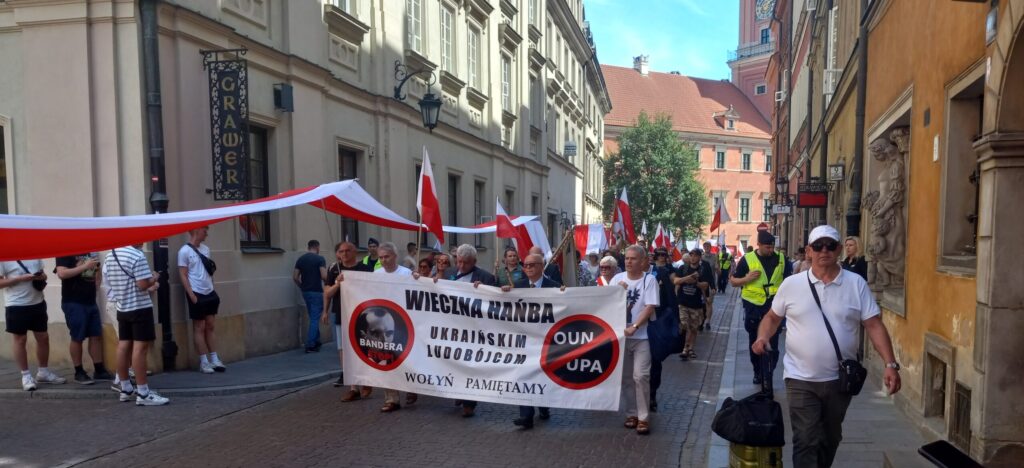
Marchers in Old Town Warsaw commemorating the anti-Polish pogroms that killed approximately 100,000 persons in 1943 in western Ukraine.
While a clear majority of Poles support Ukraine and millions have brought Ukrainian refugees into their homes, an undercurrent of anti-Ukrainian sentiment does exist. One Pole told me, “Why are we pretending that Ukrainians are our life-long friends, when they never have been and never admitted about Wołyń?” Another said that Ukrainian refugees were responsible for a rising crime rate in Poland (although a Polish police official told me this was not true).[28] One banner for another march in Warsaw commemorating Wołyń proclaimed, “Stop the Ukrainification and Banderization of Poland.” These are warning signs of stresses on Poland’s Ukraine policy. The question is will this be reflected in the upcoming October elections?
There is another electoral alternative for Poles this October that could affect Poland’s domestic and foreign policies. The Confederation for Freedom and Independence Party (also known as Konfederacja) espouses anti-Ukrainian sentiment based on historical grievances as well as anti-American sentiment for arming Ukraine and having influence in Poland.[29] According to Pawłowski, Konfederacja is strongly nationalistic and Euro-skeptic but also has a libertarian economic policy, which attracts many Poles. Polling has Konfederacja at 12 percent support, but Pawłowski believes it could get 15 percent of the vote in October, which means it could keep PiS or PO from being able to form a majority government. If that happens, the party that has a plurality of votes may attempt to form a minority government because of the difficulty of including Konfederacja in a coalition. Konfederacja is close to PO on economic policy but close to PiS on values. Its inclusion in any coalition would create an unstable political partnership.
This seems like a perfect opportunity for Russian information operations. However, Andrzej Sadicki of the Center for Eastern Studies offered a different perspective of Russian propaganda capabilities in Poland. Poles are not buying the Russian narrative of peace at all costs, he told me. What most Poles want in Ukraine is a just and lasting peace and are afraid of a Russian victory. Over two-thirds of Polish society have helped Ukraine personally by taking in refugees, donations, or other actions. He acknowledged the presence of Russian disinformation in Poland and told me how Russia coopted anti-COVID vaccine activists into espousing pro-Russian narratives that there is a moral equivalency between Russian and Ukraine in the war. Per Sadicki, the main unknowns in protecting Poland from further Russian disinformation is how long the war will last and will economic troubles cause doubt about expenditures to support Ukraine. However, Sadicki believes that Poland’s history makes it very unfertile ground for Russian disinformation.
History, geography, and personalities explain why Poland, while somewhat similar to Hungary domestically, has a diametrically opposite foreign policy regarding the Russo-Ukraine War. Poland has suffered much longer Russian occupations than Hungary. Besides being forced into the Soviet bloc as Hungary was, Poland was partitioned and occupied by Russia from 1772–1917. It shares a border with Russia along the Kaliningrad oblast and another one with Russia’s ally Belarus, which allows its territory to be used to attack Ukraine. Poland’s key political figure, Jarosław Kaczyński, lost his twin brother in a plane crash that some in his party theorize was Russian sabotage. He will never consider Russia as a possible partner. While an upcoming election could show some cracks in Polish support to Ukraine, most Poles still support Ukraine because they fear a Russian victory. But the longer the war, the wider the cracks could become.
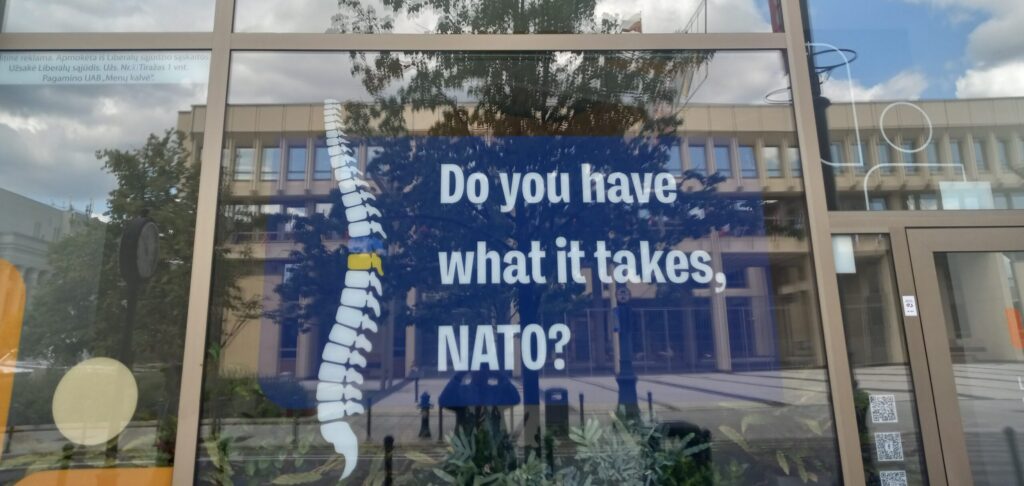
Poster that greeted NATO participants to the July 2023 summit in Vilnius.
Lithuania
If its history and geography make Poland nervous about a Russian victory in Ukraine, then Lithuania’s history and geography make it terrified. Both Poland and Lithuania were once part of the Russian empire, but while Poland was formally independent after World War II, Lithuania was forcibly incorporated into the Soviet Union. I arrived in Vilnius as the NATO summit ended and was struck by the number of Ukrainian flags flying everywhere, even in comparison to such pro-Ukrainian capitals as Warsaw and London. One Lithuanian political party, Liberalų Sąjūdis, made no pretensions of subtlety in its support for Ukrainian membership in NATO. A poster at its party headquarters showed a human backbone with two vertebrates painted the Ukrainian colors yellow and blue. Above the picture was the message, “Do you have what it takes, NATO?”
Dr. Tomas Janeliūnas, a professor of international relations at Vilnius University, explained to me why many Lithuanians take such an aggressive view. He said that fear of Russian aggression now drives Lithuanian diplomacy and military planning, which is based on a belief that Lithuania’s population of 2.8 million would be annihilated in a war. Therefore, Lithuania’s strategy is to deter Russia via a strong NATO and, if that is unsuccessful, fight with forces that are not a tripwire but sufficient for a forward defense. Janeliūnas said that society understands this and therefore accepts conscription reforms.
The “nation-at-arms” concept was also part of a conversation I had with two Lithuanian academics at the Eastern Europe Studies Center in Vilnius, Dr. Valentinas Berziunas and his wife, Dr. Viktorija Rimaitė-Beržiūnienė. Lithuania is learning from the war in Ukraine, they said, especially about how to set up civil defenses to protect people and infrastructure. National defense is no longer exclusively a military mission; now the people must help. According to Rimaitė-Beržiūnienė, societal aspects of conflict have become important. Lithuania is trying to educate society on how to recognize and counter disinformation. It is also considering an educational program for schools that would include lessons on the Forest Brotherhood, the resistance fighters who waged an anti-Soviet guerrilla war after World War II. Berziunas added that parliament had increased funding for the paramilitary Rifleman’s Union for newer weapons and more training. All of this is based on lessons learned from Ukraine.
According to Berziunas and Rimaitė-Beržiūnienė, Lithuanians see the United States as their ultimate protector against Russia but not all are convinced of US resolve. The just concluded NATO summit reinforced those fears. Both noted that Lithuanians closely analyzed Biden’s speech and were concerned that he did not connect the words “victory” and “Ukraine.” In Berziunas’ opinion, Lithuania’s security depends on Russia changing and Russia will not change if the United States does not provide enough support for Ukraine to win. Without a Ukrainian victory (and Russian defeat) Lithuania will remain on the frontlines and will have to concentrate on national security vice domestic needs. Lithuania needs a changed Russia, they said.
Adam Roževič, also of the Eastern European Studies Center, said that Lithuania’s government believes it does not have much time to increase its defenses. The narrative that Moscow is a paper tiger and no longer a threat is a dangerous one since Russia occupies as much Ukrainian territory as makes up all three Baltic states. None of the Baltic states have the strategic depth, population, and military capability of Ukraine. While Lithuanians overwhelmingly support NATO, he said that Russia tries to exploit Polish (6.8 percent of the population) and Russian (5.1 percent) minorities to lessen this support. Both groups follow Russian state television and Russian internet sites and absorb their narratives. Lithuania is working with Poland to create a Polish language television channel in Vilnius to counteract this. Russia’s Sputnik television outlet in Lithuania, he said, spends much time on the negative experiences of ethnic minorities. As our conversation ended, Roževič stressed that Lithuania is a small country trying to be an exemplary member of NATO because geography and demography puts it at the mercy of Russia. His final words to me were, “Article V is the main guarantor of Lithuanian statehood.”
I thought about Roževič’s words walking back to my hotel. Just before I arrived, I crossed what was formerly Lenin Square and now goes by its original name, Lukiškės Square. Where once stood an immense statue of Lenin, now stands a flagpole. When I visited, a huge Ukrainian flag was flying. It was a flag that had flown over Bakhmut and which Zelensky had just presented to Lithuania at the NATO summit. Across the square I noticed a beautiful late 19th-century building, which houses the Museum of Occupation and Freedom Fighters. The building under German occupation served as Gestapo headquarters and then as Soviet secret police headquarters until 1991. Over a thousand people were executed in its basement, the names of a few are now carved into the bricks of the building’s exterior. The building was once an apex of oppression, it now serves to ensure that oppression will never be forgotten. The symbolism of Lukiškės Square with Lenin replaced by the flag of Ukraine is an excellent metaphor for what is happening in the frontline states. It is what Anne Applebaum describes as the struggle between democracy and authoritarianism. On a beautiful day in July at the square, it was clear that democracy had won in this place, at this time. The only cloud in my mind was the fear that it might not always be that way.
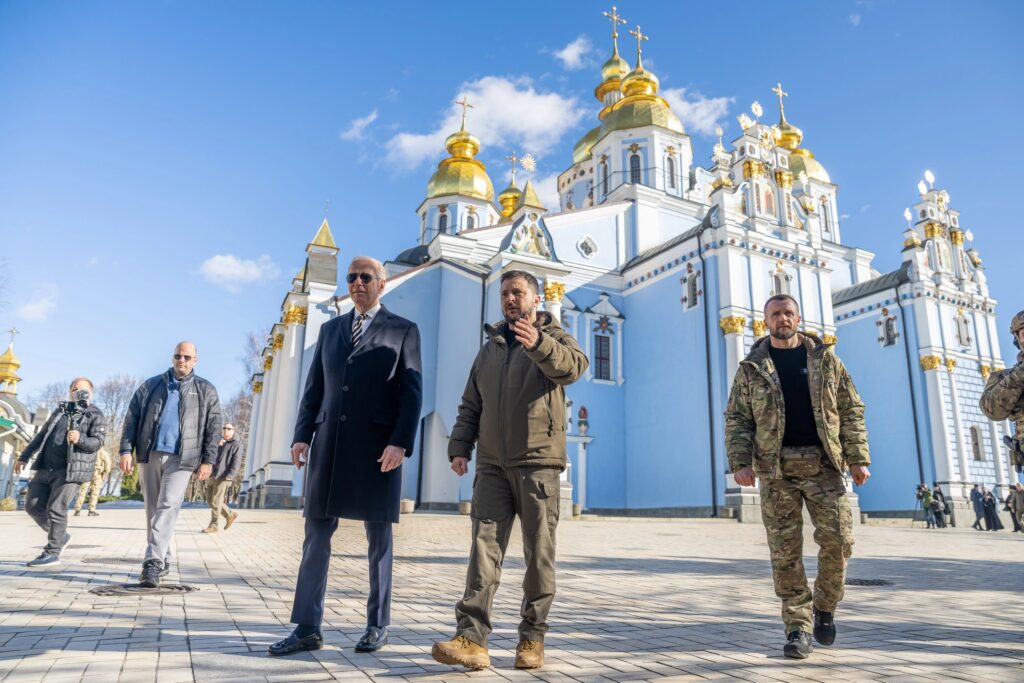
Joe Biden and Volodymyr Zelenskyy in front of St. Michael’s Golden-Domed Monastery in Kyiv, February 2023.
Conclusion and Recommendations
While each of these five countries is different, they have common features.
The first is a palpable fear of a Russian attack—ground, air, or cyber—except in Hungary. Georgia fought Russia fifteen years ago; Moldova has suffered cyber attacks; Poland borders Russia, Belarus, and Ukraine; and Lithuania’s capital lies within artillery range of Belarus. War is not theoretical for them. People fear their cities becoming like Grozny, Aleppo, Bucha, or Bakhmut. Second is the fear that subversion could undermine the democratic process or the horror that it already has. Where it has been undermined, one of the worst aspects is how lawfare is used against the opposition. Local citizens fear their governments resorting to the old phrase of past authoritarians, “For my friends everything; for my enemies THE LAW!” Another concern is how Moscow’s narratives are sometimes supported by the local Orthodox church. The final concern is of possible economic strangulation via the interruption of energy supplies or a Russian embargo of their imports.
Next to these concerns, the strongest sentiment I encountered was the belief that only the United States can protect these countries against these threats. People were not asking for a new Marshall Plan or US military interventions (although many want or want to keep the US military shield embodied in NATO). What they desire is the power of the United States in word and deed to help them. They want America to speak out when democratic values are threatened by Russian subversion or their own governments. US persuasion, many believe, can be an important weight on their domestic political scales.
This does not mean that the image of the United States is perfect in these countries or that people do not recognize what Washington already does in their countries. Activist ambassadors in Poland and Hungary were singled out for praise or scorn depending on the politics of the speaker. Liked or disliked, they were known and their words were not ignored. Foreign aid is appreciated. Almost every Moldovan I met spoke gratefully of the US-financed highway in northern Moldova. However, in all countries, I also heard fears of US resolve. Many believe that the US cares only about large countries and will make deals at the expense of small ones. They are concerned that the United States will not honor commitments over time and point not just to Ukraine but Afghanistan. America has much to make up for by signing a deal with the Taliban over the heads of the Afghan government in 2020 and its disastrous withdrawal in 2021.
There were criticisms that US public diplomacy does not reach out to average citizens or is ineffective in connecting with them. Probably the most effective form of public diplomacy is the drive and character of the US ambassador. I heard countless stories from Tbilisi to Vilnius about US ambassadors who are still remembered years later for their willingness to speak out, and willingness to engage with the general public, especially visiting areas outside the capital. The more remote the region, the more an ambassador’s visit and the comments are remembered. Many also had great memories of other US officials or citizens from Peace Corps volunteers to Fulbright Scholars as well as travel to the United States for training or education. Soft power works; if it is protected by hard power.
Unfortunately, Russian soft power also works and is backed up by hard power. While Russian tactics adapt to a particular country, there were common approaches. Russian subversion exploits peoples’ fears of threats to their identity and welfare. Key identity issues are minority group grievances, and religious and cultural values. Welfare issues are based on economic needs or threats to those needs. These fears are turned into narratives to convince people that the West is the source of their problems; Russia and pro-Russian governments are the solution.
Russian information operations weaponize histories considered unjust by the target audience to reinforce pre-existing, pro-Russian narratives. Corruption is weaponized to buy the support of politicians, journalists, and businessmen. Russian narratives erode trust in institutions, which is important because institutions help protect democracies against tyranny, even the tyranny of a majority. Russia also tries to create apathy to keep people from engaging in politics and voting by either degrading the level of political discourse or confusing people with disinformation to create “post-truth” societies where facts do not matter. These tactics are cheap and effective. Russia may run out of tanks in Ukraine, but it will not run out of trolls, bots, corrupt persons to exploit, and people with grievances to manipulate.
The US government understands this and works hard against it. People in frontline states understand this and appreciate US support. What they ask for is an even more vigorous support.
In the next two years, there will be several important elections in the region. America cannot let Moscow set the narrative for those elections. Washington must work with NATO and the European Union to counteract Russian narratives and assert Western values. This is a battle of ideas and Western-democratic ideas are wanted more than Moscow’s, if properly presented and defended. Therefore, I suggest the following:Counter Russian narratives about traditional values by reminding people that Western values are not only about tolerance but about other individual rights such as freedom of speech, press, assembly, religion, and most importantly government by the consent of the governed. None of this exists in Russia. Neither do freedom from corruption, property rights, or transparency in government and business affairs. NATO protects human freedoms; the EU protects economic ones.
Make common cause with other Eastern Orthodox churches to push back against Russian Orthodox Church attempts to consolidate the Orthodox world under Moscow’s leadership and displace the leadership of the Ecumenical Patriarch. Unite with them to oppose spiritual endorsement of politics and war. The United States should work with willing Eastern Orthodox churches like it worked with the Vatican to end the Cold War.
Increase high-level visits to this region and empower US ambassadors to publicly address democracy and rule-of-law issues in frontline states, including the use of lawfare against political opposition. Defense of these values will resonate with many. This might reverse a growing sentiment among those who feel abandoned by the United States. If this sentiment grows, US public diplomacy may soon fall on deaf ears. To affect change with soft power, America must use it or lose it.
Unlike in Ukraine, the fight in the frontline states is primarily diplomatic, economic, informational, and political. Military power, however, provides the shield under which those activities can succeed. There is great opportunity in this region for the US foreign policy to strengthen democratic norms and counter Russian subversion. As one interlocutor told me, Russia only offers the past; they have nothing to offer for our future.
George Kennan in his “Long Telegram” wrote, “World Communism is like a malignant parasite which feeds only on diseased tissue.”[30] The same applies today with Russian political warfare. This is why the political health of countries is important and why the United States is correct to challenge violations of the rule-of-law, freedom of speech and the press, judicial independence, and corruption. America may offend some close allies in doing so, but as is said, “Courage is not when you stand up to your enemies; it is when you stand up to your friends.”
No comments:
Post a Comment